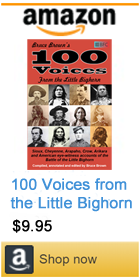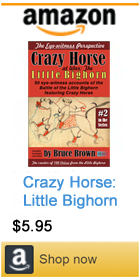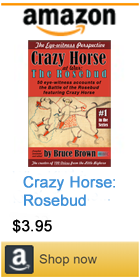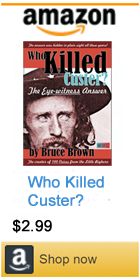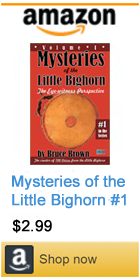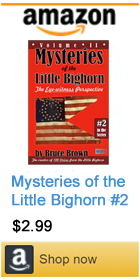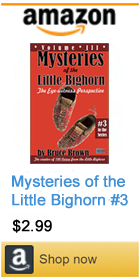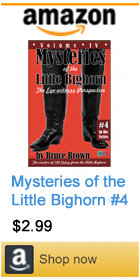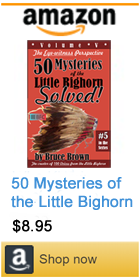Bruce Brown's 100 Voices... |
|||||||||||
Rain In The Face's Story of the Battle #2
RAIN IN THE FACE'S ACCOUNT OF THE BATTLE OF THE LITTLE BIGHORN
Coney Island, N.Y., Aug. 12, 1894. Rain-in-the-Face (Itiomagaju) hobbled into the tent to-night, as McFadden and I were discussing the events of the day, and seating himself, unbidden, with true Indian stoicism, he grunted out that one word of all words so dear to a Lakota, "Minnewaukan!" which, literally translated, means "Water of God," but which by usage has been interpreted as "fire-water." Since the other Indians were all away from camp on a visit to their friends, the Oglalas at Buffalo Bill's camp, I decided to yield for once to Rain's oft-repeated demand, which had been hitherto as regularly denied. He took my flask, and with a guttural "How!" drained it at one gulp, without straining a muscle of his face. "Ugh! good! like Rain's heart," he remarked, as he handed the empty bottle to "Mac" with a self-satisfied look. Then, after a long pause, he joined in our hearty laughter, and added: " Wechasa Chischina (Little Man, as he always calls me) good! Potoshasha (Red Beard, his name for McFadden) good! Minnewaukan good! All heap good!" "Something's come over the old man," laughed Mac. "His heart's good to-night. Suppose we take advantage of it, as the boys are all over at the Oglala tepees, and get Rain to turn his heart inside out. Here, give me my hat and I'll get the flask refilled and bring back Harry with me to interpret." Off he went like a shot, leaving me to entertain Rain as best I could with my small knowledge of the Sioux lingo and signs. McFadden soon returned, bringing Harry McLaughlin, our interpreter. It didn't take long to get Rain started; after he had had another pull at the flask, he said "If you want a story, I will tell a true one. It's about myself. I was a bad man and dangerous to fool with before I had to walk with crutches. My heart's good now, but it was all the time bad when I was a fighter and a hunter. The maidens admired me, but the bucks were afraid of me. I would rather fight than eat. The long swords (soldiers) trembled when they knew I was near, and the Rees and Crows always felt of their hair every morning to see if their scalps were still on when Rain was near by." Here Harry headed him off, for it's natural for an Indian to boast, and if any one will listen he will sing his own praises for hours at a stretch. "Yes, we know you were a bad man and a fighter from 'way back," said Harry, "but we want to hear about the time Tom Custer made you take water. If you were such a brave man, how did it happen that a little man like Tom Custer got the best of you ?" This had the desired effect, and Rain winced under such a reflection on his bravery, for he measured forty-six inches around his chest, stood five feet nine inches, and weighed about 195 pounds at that time, while Captain Tom Custer was under the average weight and height. With great deliberation and much gesticulation, Rain told his version of the incident in question, and much to our surprise he continued on and related his version of the "Custer Massacre." Now, since nearly all the officers in the Regular Army, as well as all the agents of the Interior Department, have failed to get him even to speak of this fight (their trying, coaxing, and threatening for years has been in vain), and since Rain gets the credit of being the slayer of Custer, and has been immortalized in verse by Longfellow, it was a pleasant surprise to have this unexpected revelation. I am writing it down as nearly like McLaughlin interpreted it as I can. "Two years before the big fight," he said, "Gall and Sitting Bull had their camp at Standing Rock. All were hostiles. They were Unkpapa Sioux and fighters who never feared an enemy any more than a buffalo calf. The Yanktonais (friendly Indians) were coffee coolers (cowards) and hung around the agency which was at Lincoln then (Fort Abraham Lincoln on the upper Missouri now). We used to have great times in the hostile camp, dancing, running races, shooting and playing games. Buffalo and deer were plenty, and we had many ponies. I was a great fellow with the girls. They used to tease me to get me mad -- when I got mad I knew no reason, I wanted to fight. One night a girl dared me to go up to Fort Lincoln and kill a white man. I told her it was too risky, as the long swords always kept watch. Besides, the Rees (another tribe of Indians, employed by the government as scouts) had their lodges on the hill back of the fort. The wood-choppers were camped between the fort and the river.She said: "`A brave man fears nothing. If you are a coward, don't go. I'll ask some other young man who isn't afraid, if he hasn't danced in the Sun Dance.' (This was a torture dance in which Rain-in-the-Face subsequently underwent the most horrible self-torture ever inflicted.*) "The other girls laughed, but the young men who heard it didn't. They feared me. I would have killed them for laughing. I went to my lodge and painted sapa (black, the color used when they go on the warpath), took my gun, my bow, my pony. Sitting Bull had forbidden any one to leave camp without his permission. I skipped off under cover of darkness and went up to Lincoln (forty-five miles north, opposite the present site of Bismarck, North Dakota). I hung around for two days, watching for a chance to shoot a long sword. I had plenty of chances to kill a Ree squaw, plenty to kill a wood-chopper, but I wanted to carry back the brass buttons of a long sword to the girl who laughed at me. I did so, and she sewed them on her shawl. One morning I saw the sutler (store keeper) and a horse medicine man (U. S. Veterinary Surgeon Hontzinger) go out to a spring; Long Yellow Hair (General Custer) and his men were riding back about 100 yards. I rushed up and shot the sutler and brained the horse medicine man with my war club; then I shot them full of arrows and cut off some buttons. Long Yellow Hair heard the shot and his troop charged back. I didn't have time to scalp the men I got. I jumped on my pony and yelled at them to catch me. They chased me to the Cannon Ball (a small river twenty-five miles south). Charlie Reynolds (a scout) knew me and told Long Yellow Hair who did this brave deed. "Next winter I went to the agency store at Standing Rock. I drew no rations - I hadn't signed the paper. (All the Indians who signed a peace treaty and consented to live on the reservation, under military orders, were furnished with rations by the government twice a month. The hostiles had to live by hunting.) Istokscha (One Arm, the Hon. H. S. Parkin) was running the store then. I wasn't afraid of any of them. Little Hair (Capt. Tom Custer) had thirty long swords there. He slipped up behind me like a squaw, when my back was turned. They all piled on me at once; they threw me in a sick wagon (ambulance) and held me down till they got me to the guard-room at Lincoln. "I was treated like a squaw, not a chief. They put me in a room, chained me, gave me only one blanket. The snow blew through the cracks and on to me all winter. It was cold. Once Little Hair let me out and the long swords told me to run. I knew they wanted to shoot me in the back. I told Little Hair that I would get away some time; I wasn't ready then; when I did, I would cut his heart out and eat it. I was chained to a white man. One night we got away. They fired at us, but we ran and hid on the bank of Hart river in the brush. The white man cut the chains with a knife (a file). They caught him next day. "I rejoined Sitting Bull and Gall. They were afraid to come and get me there. I sent Little Hair a picture, on a piece of buffalo skin, of a bloody heart. He knew I didn't forget my vow. The next time I saw Little Hair, ugh! I got his heart. I have said all." And, Indian-like, he stopped. We all knew that the greater part of this was true, since it tallied with the government account of the death of the sutler and Surgeon Hontzinger. But we wanted to hear how he took Tom Custer's heart. McFadden, who is quite an artist as well as an actor of note, had made an imaginary sketch of "Custer's Last Charge." He got it and handed it to Rain, saying: "Does that look anything like the fight ?" Rain studied it a long time, and then burst out laughing. "No," he said, "this picture is a lie. These long swords have swords -- they never fought us with swords, but with guns and revolvers. [Note: this is true. Little Bighorn survivor Edward Godfrey said, "The command was armed with the Springfield and the Colt revolver; every officer carried a revolver. NO ONE CARRIED THE SABER."] These men are on ponies -- they fought us on foot, and every fourth man held the others' horses. That's always their way of fighting. We tie ourselves onto our ponies and fight in a circle. These people are not dressed as we dress in a fight. They look like agency Indians -- we strip naked and have ourselves and our ponies painted. This picture gives us bows and arrows. We were better armed than the long swords. Their guns wouldn't shoot but once -- the thing wouldn't throw out the empty cartridge shells. (In this he was historically correct, as dozens of guns were picked up on the battlefield by General Gibbon's command two days after with the shells still sticking in them, showing that the ejector wouldn't work.) [Note: Testimony from survivors on both side mentions the "shell ejection problem" with the American's guns.] When we found they could not shoot we saved our bullets by knocking the long swords over with our war clubs -- it was just like killing sheep. Some of them got on their knees and begged; we spared none -- ugh! This picture is like all the white man's pictures of Indians, a lie. I will show you how it looked. " Then turning it over, he pulled out a stump of a lead pencil from his pouch and drew a large shape of a letter S, turned sideways.* "Here," said he, is the Little Big Horn river; we had our lodges along the banks in the shape of a bent bow." "How many lodges did you have?" asked Harry. "Oh, many, many times ten. We were like blades of grass. (It is estimated that there were between four and six thousand Indians, hence there must have been at least a thousand lodges.) "Sitting Bull had made big medicine way off on a hill. He came in with it; he had it in a bag on a coup-stick. He made a big speech and said that Waukontonka (the Great Spirit) has come to him riding on an eagle. Waukontonka had told him that the long swords were coming, but the Indians would wipe them off the face of the earth. His speech made our hearts glad. Next day our runners came in and told us the long swords were coming. Sitting Bull had the squaws put up empty death lodges along the bend of the river to fool the Ree scouts when they came up and looked down over the bluffs. The brush and the bend hid our lodges. Then Sitting Bull went away to make more medicine and didn't come back till the fight was over. "Gall was head chief; Crazy Horse led the Cheyennes; Goose the Bannocks. I was not a head chief -- my brother Iron Horn was -- but I had a band of the worst Unkpapas; all of them had killed more enemies than they had fingers and toes. When the long swords came, we knew their ponies were tired out; we knew they were fooled by the death lodges. They thought we were but a handful. "We knew they made a mistake when they separated. Gall took most of the Indians up the river to come in between them and cut them off. When we saw the Ree scouts had stayed back with Long Yellow Hair, we were glad. We saw them trotting along, and let them come in over the bluffs. Some of our young men went up the gully which they had crossed and cut them off from behind. "Then we showed our line in front, and the long swords charged. They reeled under our fire and started to fall back. Our young men behind them opened fire. Then we saw some officers talking and pointing. Don't know who they were, for they all looked alike. I didn't see Long Yellow Hair then or afterward. We heard the Rees singing their death song -- they knew we had them. [Note: Here is the Arikara scouts account of that moment.] All dismounted, and every fourth man held the others' ponies. Then we closed all around them. We rushed like a wave does at the sand out there (the ocean beach) and shot the pony holders and stampeded the ponies by waving our blankets in their faces. Our squaws caught them, for they were tired out. "I had sung the war song, I had smelt the powder smoke. My heart was bad -- I was like one that has no mind. I rushed in and took their flag; my pony fell dead as I took it. I cut the thong that bound me. I jumped up and brained the long sword flag-man with my war club, and ran back to our line with the flag. "The long sword's blood and brains splashed in my face. It felt hot, and blood ran in my mouth. I could taste it. I was mad. I got a fresh pony and rushed back, shooting, cutting, and slashing. This pony was shot, and I got another.
"I didn't go back on the field after that. The squaws came up afterward and killed the wounded, cut their boot legs off for moccasin soles, and took their money, watches, and rings. They cut their fingers off to get them quicker. They hunted for Long Yellow Hair to scalp him, but could not find him. He didn't wear his fort clothes (uniform), his hair had been cut off, and the Indians didn't know him. (This corroborates what Mrs. Custer says about her husband's having his long yellow curls cut at St. Paul some weeks before he was killed.) "That night we had a big feast and the scalp dance. Then Sitting Bull came up and made another speech. He said: 'I told you how it would be. I made great medicine. My medicine warmed your hearts and made you brave.' "He talked a long time. All the Indians gave him the credit of winning the fight because his medicine won it. But he wasn't in the fight. Gall got mad at Sitting Bull that night. Gall said: `We did the fighting, you only made medicine.' It would have been the same anyway. Their hearts were bad toward each other after that, always. "After that fight we could have killed all the others on the hill (Reno's command) but for the quarrel between Gall and Sitting Bull. Both wanted to be head chief. Some of the Indians said Gall was right and went with him. Some said Sitting Bull was. I didn't care, I was my own chief and had my bad young men; we would not obey either of them unless we wanted to, and they feared us. "I was sick of fighting -- I had had enough. I wanted to dance. We heard more long swords were coming with wheel guns (artillery, Gatlings). We moved camp north. They followed many days till we crossed the line. I stayed over there till Sitting Bull came back, and I came back with him. That's all there is to tell. I. never told it to white men before." When he had finished, I said to him: "Rain, if you didn't kill Long Yellow Hair, who did?" "I don't know. No one knows. It was like running in the dark." [Note: in another interview, Rain In The Face nominated an Anonynmous Youth as Custer's killer. See Who Killed Custer -- The Eye-Witness Answer for more info.] "Well," asked Mac, "why was it Long Yellow Hair wasn't scalped, when every one else was? Did you consider him too brave to be scalped ?" "No, no one is too brave to be scalped; that wouldn't make any difference. The squaws wondered afterward why they couldn't find him. He must have laid under some other dead bodies. [Note: White Cow Bull said it was beecause Monaseetah protected Custer's corpse.] I didn't know, till I heard it long afterward from the whites, that he wasn't scalped." "How many Indians were killed in the fight?" "I don't remember, but about ten and four or ten and six. " "How about Curley, the Crow scout, who claims to have escaped ?" asked Mac. "Ugh! I know Curley. He is a liar. He never was in the fight. His pony stumbled and broke something. He stayed behind to fix it. When he heard the firing, he ran off like a whipped dog. One long sword escaped, though; his pony ran off with him and went past our lodges. They told me about it at Chicago. I saw the man there, and I remembered hearing the squaws tell about it after the fight." Rain-in-the-Face (Itiomagaju) is about sixty years of age now, and is the only chief that survives to tell the tale of the Custer fight. Gall and Sitting Bull have both gone to hunt the white buffalo long since. Rain can write his name in English. I taught him to do it at the World's Fair in order to sell Longfellow's poem, entitled "The Revenge of Rain-in-the-Face." He doesn't know the significance of it after he writes it. His knowledge of English is confined to about thirty words, but he can't say them so any one can understand him, though he can understand almost anything that is said in English. Like all other Indians, his gratitude is for favors to come and not for favors already shown. He is utterly heartless and unprincipled, physically brave but morally a coward. His redeeming feature lies in the fact that you can depend upon any promise he makes, but it takes a world of patience to get him to promise anything. Even at the age of sixty he is still a Hercules. In form and face he is the most pronounced type of the ideal Fenimore Cooper, dime novel Indian in America. Indian Fights and Fighters by Cyrus Townsend Brady, McClure, Philips & Co., New York, NY,1904 p 279 - 292
The two primary accounts of the battle by Rain In The Face are very different, and frankly contradictory. The first (actually the second chronologically) by Santee Sioux Ohiyesa is sympathetic and respectful -- essentially a death bed conversation between two old friends -- while the second by American journalist W. Kent Thomas is glibly exploitive -- Thomas purportedly got Rain In The Face drunk to induce him to tell his tale. Yet both accounts sound like the same man talking, and they both have something to contribute, even if they contradict each other at many important turns. For instance, in the Ohiyesa version, Rain In The Face identified an Anonymous Youth (who was subsequently slain) as Custer's killer, while in the Thomas version, he said no one knew who killed Custer -- "it was like running in the dark." In the Thomas version, Rain In The Face said he cut out his old nemesis Tom Custer's heart and spit it in his face, while in the Ohiyesa version he denied the whole Tom Custer battlefield episode -- "many lies were told about me." Even so, the Battle of the Little Bighorn story most closely associated with Rain In The Face is probably still the famous poem by Henry Wadsworth Longfellow,"The Revenge of Rain-in-the-Face," which features Rain In The Face cutting out Tom Custer's heart in "revenge" for his abusive treatment of Rain In The Face at Ft. Lincoln the year before, witnessed by Frank Huston, who saw Tom Custer "kick and slap Rain while troopers held him." Historically speaking, Longfellow's poem is steeped in misconception. For starters, neither Custer nor his men were carrying sabers (as Rain In The Face correctly recalled in the W. Kent Thomas interview). More importantly, Seventh Cavalry surgeon Dr. H.R. Porter, who examined the corpses the day after the battle, said neither George nor Tom Custer's heart was not cut out (although Charles Roe, who was on the burial detail after the battle, disagreed). Furthermore, based on the eye-witness record, it appears that Oglala Sioux war chief Little Horse or Minneconjou Sioux warrior Lazy White Bull were more likely Tom Custer's killer. Nonetheless, Rain In The Face was a force at the Battle of the Little Bighorn. Ohiyesa said Rain In The Face was a leader of the Indians' first counter-charge against Reno, which forced the American troopers to abandon their defensive line in the open and fall back to the timber along the river. Thunder Bear called Rain In The Face the bravest man in the battle. Little Knife said the Rain In The Face was the only Indian who took a Seventh Cavalry prisoner during the battle. * * * Here is the original introdctory note to this chapter in Indian Fights and Fighters... "It is rare, indeed, to get the Indian side of a story in so clear, so connected, and so dramatic a form as is the following account of the Battle of the Little Big Horn from one who played a great part in it and in the events that led up to it. This is a unique document in our records, and is inserted here by kind permission of Mr. Thomas. It originally appeared in Outdoor Life, Vol. XI., No. 3, for March, 1903. Its accuracy and fidelity to fact are so attested as to be beyond question. - C. T. B. "THE writer saw much of the "Custer Indians" at the World's Fair and afterward at Coney Island, and had a good chance to know some of them well. The following leaves from a diary kept at that time show how the Indians regarded the Custer fight; they considered that the white men were simply outgeneraled by Sitting Bull..." -- Bruce Brown
|
|||||||||||



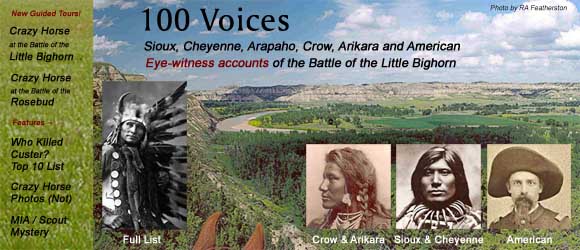
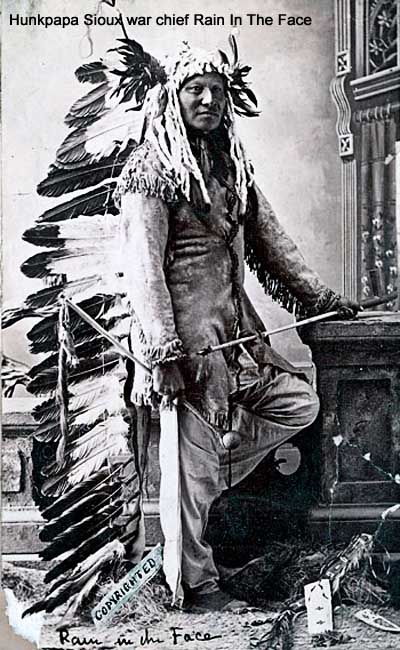 By W. Kent Thomas
By W. Kent Thomas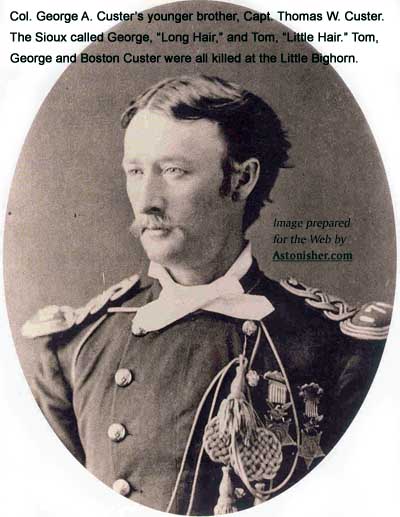 "This time I saw Little Hair. I remembered my vow. I was crazy; I feared nothing. I knew nothing would hurt me, for I had my white weasel-tail charm on.* (He wears the charm to this day.) I don't know how many I killed trying to get at him. He knew me. I laughed at him and yelled at him. I saw his mouth move, but there was so much noise I couldn't hear his voice. He was afraid. When I got near enough I shot him with my revolver. My gun was gone, I don't know where. I leaped from my pony and cut out his heart and bit a piece out of it and spit it in his face. I got back on my pony and rode off shaking it. I was satisfied and sick of fighting; I didn't scalp him. [Note: Charles Roe said, "His [Thomas Custer's] heart was cut out, and in the village was found
"This time I saw Little Hair. I remembered my vow. I was crazy; I feared nothing. I knew nothing would hurt me, for I had my white weasel-tail charm on.* (He wears the charm to this day.) I don't know how many I killed trying to get at him. He knew me. I laughed at him and yelled at him. I saw his mouth move, but there was so much noise I couldn't hear his voice. He was afraid. When I got near enough I shot him with my revolver. My gun was gone, I don't know where. I leaped from my pony and cut out his heart and bit a piece out of it and spit it in his face. I got back on my pony and rode off shaking it. I was satisfied and sick of fighting; I didn't scalp him. [Note: Charles Roe said, "His [Thomas Custer's] heart was cut out, and in the village was found 